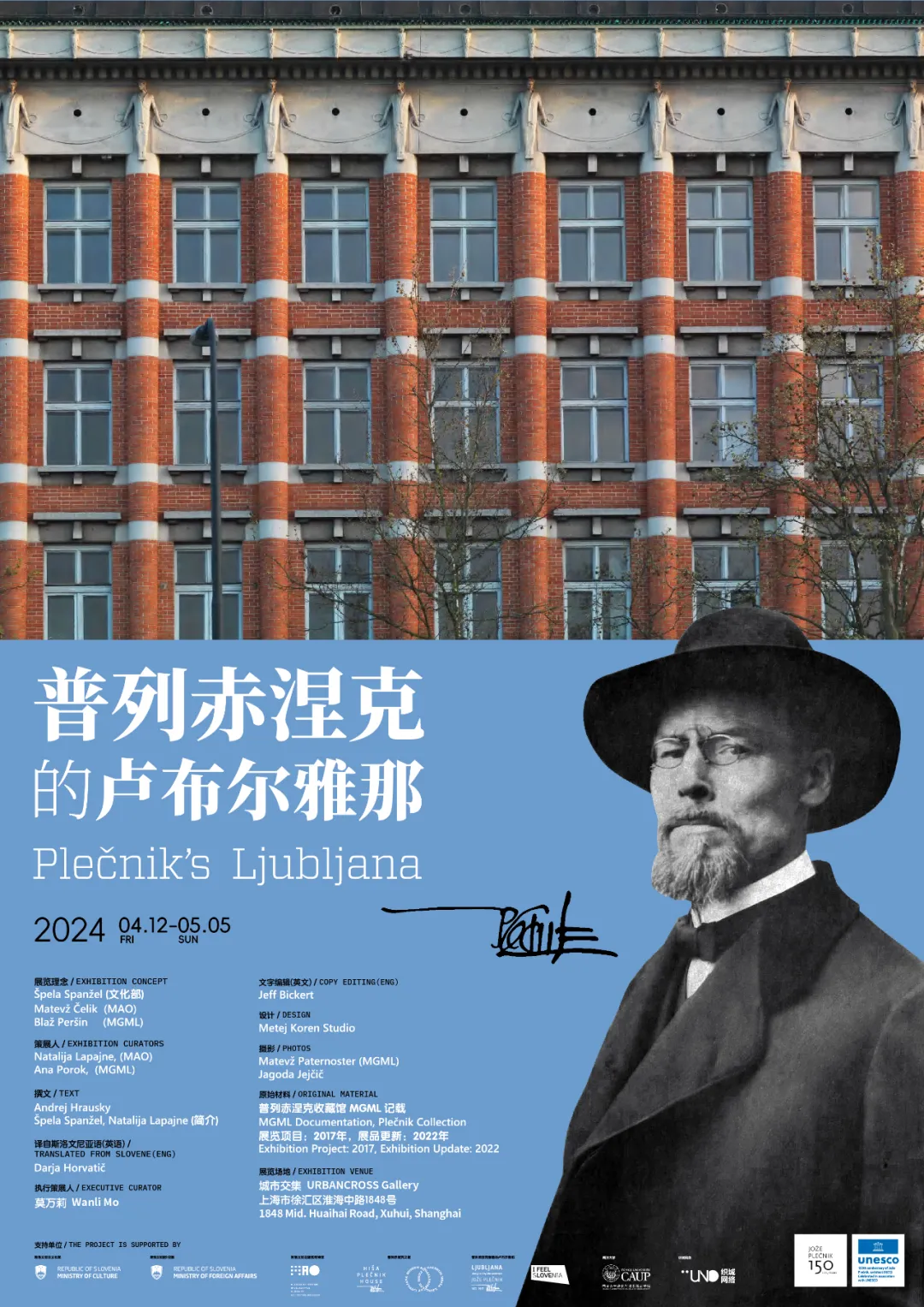
 “沼泽中的圣迈克尔”教堂 Church of St. Michael on Barje Marshlands摄 影 Photograph: Matevž Paternoster (MGML)
“沼泽中的圣迈克尔”教堂 Church of St. Michael on Barje Marshlands摄 影 Photograph: Matevž Paternoster (MGML)
展期 / DURATION
2024年4月12日至2024年5月5日
周二至周日TUE to SUN,10:30 am 至 7:00 pm
周一不开放
Close on Monday
地址 / ADDRESS
URBANCROSS Gallery | 城市交集
上海市徐汇区淮海中路1848号
1848 Mid. Huaihai Road, Xuhui, Shanghai
展览理念 /EXHIBITION CONCEPT
Špela Spanzel(文化部)
Matevž Celik(MAO)
Blaž Persin(MGML)
策展人/ EXHIBITION CURATORS
Natalija Lapajne,(MAO)
Ana Porok,(MGML)
撰文/TEXT
Andrej Hrausky
Špela Spanžel
Natalija Lapajne (简介)
译自斯洛文尼亚语(英语)
TRANSLATED FROM SLOVENE(ENG)
Darja Horvatič
文字编辑(英文)/ COPY EDITING(ENG)
Jeff Bickert
设计/DESIGN
Metej Koren Studio
摄影/PHOTOS
Matevž Paternoster (MGML)
Jagoda Jejčič
原始材料/ORIGINAL MATERIAL
普列赤涅克收藏馆 MGML 记载
MGML Documentation, Plečnik Collection
展览项目: 2017年,展品更新: 2022年
Exhibition Project: 2017, Exhibition Update: 2022
执行策展人 /EXECUTIVE CURATOR
莫万莉 Wanli Mo

普列赤涅克塑造的卢布尔雅那
2022年是斯洛文尼亚建筑师约热•普列赤涅克诞辰150周年,为纪念这位建筑师,我们将该年度定为“普列赤涅克年”。然而,我们对他的作品的认可和欣赏并不受时间和空间的限制,因为所有细心的观察者都能从它们身上发现普遍价值和不朽的光辉。
In 2022 we are celebrating the Plečnik year to commemorate the 150th anniversary of the birth of the Slovenian architect Jože Plečnik. But our recognition and appreciation of his creations is not limited solely to a moment in time and space because his work touches the very universality and timelessness recognizable to all attentive observers.
卢布尔雅那以城中古罗马时期遗迹,特别是巴洛克风格的建筑著称。1895年地震后,卢布尔雅那建起了第一座现代城市建筑,它出自与普列赤涅克同时代的马克斯·法比亚尼之手。从此,卢布尔雅那从沉睡的乡村小镇逐渐蜕变为现代新艺术中心,展示了新的审美理念。
Characterized by the remains of the Roman period and particularly by Baroque style architecture, Ljubljana received its first modern urban design, a work of Plečnik’s contemporary Maks Fabiani, after the earthquake in 1895. From being a sleepy provincial town it transformed into a modern Art Nouveau style capital displaying new aesthetic ideals.

普列赤涅克花了近30年,才把他对卢布尔雅那的构想变为现实。他重新设计并翻新原有建筑物,比如1921年至1957年间,他在城市网格中建造了许多令人印象深刻的建筑。
It took Plečnik nearly three decades to put his vision of Ljubljana into reality. Faced with an already built-up space, he redesigned and upgraded it, and between 1921 and 1957 he filled its city grid with a number of impressive buildings.

国家及大学图书馆 地址:特加斯卡路1号 卢布尔雅那大学委托NATIONALAND UNIVERSITYLIBRARY, ADDRESS Turiaška 1, COMMISSIONED BY University of Ljubljana1930至1940年设计 1936至1941年建造DESIGN 1930-1940 CONSTRUCTION 1936-1941国家及大学图书馆、诸圣花园——扎莱、西斯卡的圣方济各教堂以及卢布尔雅那三重桥就是他留给这城市的代表作。从他位于特尔诺沃的故居到市中心的国会广场,再到兹韦兹达公园的陆上中轴线代表了城市的文化带,而水上的轴线包括卢布尔雅尼察河流域的诸项工程:起自特尔诺夫斯基河堤,顺市中心的卢布尔雅尼察河堤、鞋匠桥、三重桥和中央市场延伸,终到水闸。他重建沿线的堤岸和桥梁,植树种草(他视植被为重要建筑工具),赋予卢布尔雅尼察河上的这座城市以地中海风情。第三条轴线连接了蒂沃利公园的扎科皮可滨海步道和城堡山上的卢布尔雅那城堡。诸圣花园是今天扎莱公墓的一部分,它代表了普列赤涅克对卢布尔雅那城公民的极度体贴与尊重。他重塑了这座城市,所以今天我们称它为“普列赤涅克的卢布尔雅那”——一个独特的城市规划现象,也是20世纪的艺术作品。
The National and University Library, the Garden of All Saints – Žale, the St. Francis Church in Šiška, and the Ljubljanica bridges are some of his most important interventions within the city. The land axis leading from his house in Trnovo to the Congress Square and the Zvezda Park in the city center represents the city’s cultural avenue. The water axis comprises the arrangement of the Ljubljanica basin, starting with the Trnovski pristan embankment, continuing with the Ljubljanica embankments in the city center, the Cobblers Bridge, the Triple Bridge and the main market, and ending in the sluice gates. With the reconstruction of the embankments and bridges, and with the placing of trees and other vegetation, which he regarded as an important architectural tool, Plečnik lent the city on the Ljubljanica a Mediterranean character. The third axis connected the Jakopič Promenade in the Tivoli Park and the Ljubljana Castle on the Castle Hill. The Garden of All Saints, a part of today’s Žale Cemetery, represents a special place: it is Plečnik’s expression of extreme sensitivity and respect for the citizens of Ljubljana. He transformed the city to such an extent that today we see it as »Plečnik’s Ljubljana«, a unique phenomenon of urban planning and a 20th century total work of art. 
三重桥 卢布尔雅那市政府委托
TRIPLE BRIDGE, COMMISSIONED BY Municipality of Ljubliana
1929至1931年设计 1930至1932年建造
DESIGN 1929-1931 CONSTRUCTION 1930-1932
除斯洛文尼亚首都外,普列赤涅克也活跃在布拉格。受马萨里克总统委托,他翻新了布拉格城堡,还设计了圣心教堂,后者成为许多捷克建筑师的灵感来源。除了在维也纳设计的扎切尔之家和圣灵教堂等早期作品外,他还为贝尔格莱德和达尔马提亚的教堂,以及萨拉热窝、萨格勒布和奥西耶克的修道院留下了大量作品。此外,他设计的建筑散见于斯洛文尼亚各城镇中。
In parallel with the Slovenian capital, Plečnik was also active in Prague where his renovations of the Prague Castle, commissioned by the President Masaryk, and his design for the Church of the Most Sacred Heart of Our Lord became a source of inspiration for many Czech architects. In addition to the early works in Vienna, where he designed the Zacherl House and the Church of the Holy Spirit, the architect made a number of for churches in Belgrade and Dalmatia, and monasteries in Sarajevo, Zagreb and Osijek. His works can be also found in many Slovenian towns.
与20世纪初的建筑潮流,特别是盛气凌人的现代主义风格相反,普列赤涅克发展了自己的建筑语言。他以独特方式重新诠释古建筑,又以永恒的建筑元素丰富象征主义的内涵。他升级并翻新老建筑,赋予其现代风格,还以新方式开发其传统功能。他的建筑构想为不同时代的重大问题提供通用的解决方案,与时俱进,从不落后。
Contrary to the trends in architecture at the beginning of the twentieth century, in particular the domineering modernist style, Plečnik developed his own architectural language. His distinctive approach to the re-interpretation of architectural heritage and his extremely rich symbolism include the elements of timeless architecture. With this approach, he upgrades and reinterprets the space, while at the same modernizes it and looks for the new ways to utilize its traditional functions. His architecture offers universal solutions for big issues of different generations and thus remains always relevant.为了确保他的作品能得到国际社会认可,由文化部牵头,斯洛文尼亚的专家、机构和社区共同努力,将其列入联合国教科文组织世界遗产名录。2021年,世界遗产委员会决定将“普列赤涅克的卢布尔雅那”遗产列入对人类具有突出价值的遗产名录。新入选的世界遗产由公共空间和各机构建筑组成,巧妙融入现有的城市、文化和自然环境,为城市创造了新名片,同时满足居民需求。
To ensure the international recognition of the architect's work, Slovenian experts, institutions and communities under the leadership of the Ministry of Culture have joined efforts in the preparation of the nomination for the UNESCO World Heritage List. In 2021, the World Heritage Committee adopted the decision to include Plečnik's Ljubljana on the list of heritage considered to be of outstanding value to humanity. The newly inscribed World Heritage property thus consists of public spaces and institutions that have been subtly integrated into the existing urban, cultural, and natural contexts to create a new identity for the city and answer the needs of its residents.

1918年,第一次世界大战结束,奥匈帝国垮台,有许多新国家建立。斯洛文尼亚成为由斯洛文尼亚人、克罗地亚人和塞尔维亚人建立的新国家,即于1929年成立的南斯拉夫王国的一部分。这样,建立斯拉夫国家的长期愿望得以实现。
With the fall of the Austro-Hungarian Monarchy after World War I (1918), many new states emerged, and Slovenia found itself a part of the new State of Slovenes, Croats and Serbs, or what would later become the Kingdom of Yugoslavia (1929). With this, the long-standing aspirations towards a Slavic state were fulfilled.
斯拉夫建筑师中有许多人曾在维也纳师从奥托·瓦格纳教授,但认为瓦格纳的建筑深受德国文化影响。新的民族国家建立后,他们离开前任导师,试图建立有民族特色的原创建筑风格。当时这种风格的领军人物是伊万·伍尔尼克,即卢布尔雅那建筑学院的创始人。约热•普列赤涅克应伍尔尼克之邀来任教,其对古典地域主义的诠释与伍尔尼克的民族浪漫主义建筑形成对比。普列赤涅克、约瑟夫·玛丽亚·奥尔布里希和约瑟夫·霍夫曼是奥托·瓦格纳最有才华的学生。早在第一次世界大战之前,他就在维也纳设计建筑,其中代表作为“扎切尔之家”(1905年)。维也纳学院甚至提名普列赤涅克为瓦格纳的继任者,但由于政治原因,提名没有得到批准。1911年,普列赤涅克搬到布拉格,1920年,总统托马斯·加里格·马萨里克任命他为建筑师,为新的民主国家翻新布拉格城堡。尽管被委以重任,普列赤涅克还是决定要回到祖国。回国后,他把为国家首都卢布尔雅那规划的蓝图付诸实施。国家及大学图书馆、诸圣花园(扎莱公墓)、西斯卡的圣方济各教堂和卢布尔雅那河上的桥梁都是他最重要的作品。这座城市配得上“普列赤涅克的卢布尔雅那”的赞誉。建筑师没有随波逐流,追随当代建筑的脚步,而是另辟蹊径。他希望人们理解自己的作品,于是使用了古典建筑元素。他对城市的重塑有目共睹,而且循序渐进,但大多数时候,他能支配的财政预算有限。为节省资金以丰富室内细节,普列赤涅克使用造价更低的沙子、水泥板和旧石材等原料。
Slavic architects, many of whom had studied under professor Otto Wagner in Vienna, saw Wagner’s architecture as an expression of German culture. With the emergence of new national states, they turned away from their former master and attempted to develop an original architectural style with a national point of view. At the time, the principal advocate of such style was Ivan Vurnik, the founder of the Faculty of Architecture in Ljubljana. Jože Plečnik, whom Vurnik had invited to be a professor at the faculty, contrasted Vurnik’s national romantic architecture with his own interpretation of classical regionalism. Plečnik, along with Joseph Maria Olbrich and Josef Hoffmann, was one of the most talented of Otto Wagner’s students. Already before World War I he designed buildings in Vienna, the most important being Zacherl House (1905). The academy in Vienna even nominated Plečnik as Wagner’s successor, but for political reasons the nomination was not approved. In 1911, Plečnik moved to Prague where in 1920 President Tomáš Garrigue Masaryk appointed him the architect in charge of the renovation of the Prague Castle for purposes of the new democtratic state. Despite this prestigious position, Plečnik was ready to return to his home country. Back home he tried to implement his own vision of Ljubljana as the nation’s capital. With the National and University Library, All Saints Garden – the Žale Cemetery, the Church of St. Francis in Šiška and bridges over the Ljubljanica river, to name only his most important interventions, the city deserves to be called Plečnik’s Ljubljana. Rather than following trends in contemporary architecture, the architect followed his own path. He wanted his work to be understood by people, so he used the language of classical architectural elements. His interventions in the city were recognizable and gradual, most of them with only limited financial resources at his disposal. In order to save money to architecturally enrich the interiors, Plečnik used cheaper materials: sand, cements slabs and old stones.
普列赤涅克之家 地址: 卡鲁诺瓦路4-6号 由普列赤涅克家族委托
PLEČNIK HOUSE, ADDRESS Karunova ulica 4-6, COMMISSIONED BY Plečnik family
1921至1923年设计 1923至1930年建造
DESIGN 1921-1923 CONSTRUCTION 1923-1930
历史上不乏由某位建筑师独自设计城市的先例。在大多数情况下,他们建造新城市(巴西利亚:卢西奥·科斯塔,奥斯卡·尼梅耶尔)或在战后改造城市(勒阿弗尔:奥古斯特·佩雷)。但在卢布尔雅那,普列赤涅克花几十年重新规划现有城市,以突出其固有的品质。为了使这座城市更加引人注目,他设计街道、广场和公园,并在现存街道网格中建造新建筑。他意识到城市与河流之间联系的重要性,于是将卢布尔雅尼察河作为城市的主题之一。他承认老一辈人的努力,并试图让旧元素能够——至少象征性地——在他的新设计中焕发生机。年轻时在维也纳,他是先锋派的一员;在布拉格,他留下了不朽的设计;在卢布尔雅那,他设法用相对较少的资金将这座城市改造成斯洛文尼亚的首都。今天现代城市生活已势微,而花费了他数十年心血的卢布尔雅那却成为独特而无与伦比的丰碑。
History knows several cases of a city designed by a single architect. In most cases such a scenario involved building a new city (Brasilia: Lúcio Costa, Oscar Niemeyer) or a post-war renovation (Le Havre: Auguste Perret), but in Ljubljana, Plečnik intervened in an existing city, redesigning it for decades in order to highlight its existing qualities. To make the city more remarkable, he designed streets, squares and parks, and placed new buildings into the existing street grid. He was aware of the importance of contact between the city and the river, so he established the Ljubljanica river as one of the city’s guiding urban motifs. In his interventions, he acknowledged the efforts of older generations and tried to reuse the old elements so that they could, at least symbolically, continue living in his new designs. While during his young years in Vienna he was a part of the avant-garde, and in Prague he produced monumental designs, in Ljubljana he managed to use relatively modest funds to transform the city into the capital of Slovenes. Today, when we are faced with the impotence of modern urbanism, his decades-long designing of Ljubljana represents a unique and unparalleled achievement.
支持单位
发文/审核编辑|Heloise
